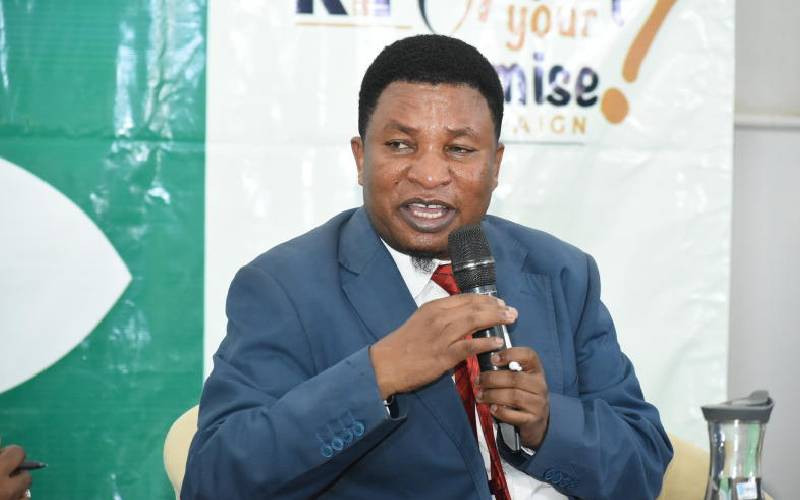
Pan African Climate Justice Alliance Executive Director Mwenda Mithika addresses a past press conference on climate action. [File, Standard]
The Pan African Climate Justice Alliance, in partnership with Addis Ababa University, is hosting this year's fifth international symposium on Climate Change, opening the 5 cohort of Nairobi Summer School on Climate Justice (NSSCJ).
Themed "aspiring a livable future: youth-led transformation in the poly-crisis era," the symposium was officially opened on Monday by Dr. Fitsum Assefa, the Ethiopia's Minister of Planning and Development, alongside diplomats, development partners, civil society, academia, and youth.
Africa is bearing the adverse impacts of Climate Change, yet it emits 4 per cent of global emissions. The climate related hazards continue to cost African economies between 2 and 5 per cent of GDP annually. While collective climate action efforts are needed, the symposium highlighted the role of African youth in shaping solutions to the continent amid the escalating climate crisis. Dr. Assefa reminded that a livable future is possible when the continent remains focused. She called on Africa to advocate for itself instead of waiting for others to act at its expense.
"We will not sit back and wait for the world to respond-we shall act, and act now. Africa must take its rightful place in global finance, in international architecture, and across all sectors. A livable future is possible if we act with purpose and courage," she said. She further pointed out that "We know strategies and programmes alone are not enough. It is the creativity, passion and courage of young people that will carry us forward. The Nairobi Summer School on Climate Justice is a powerful testament to this truth".
Swedish International Development Agency (SIDA) Regional Programme Manager stated that the challenges of climate change are intricate and interconnected and should be planned for. "Future thinking is not about predicting the future with certainty but rather about broadening our understanding of what is possible, plausible, probable and preferable." Kabede also called for youth inclusion in climate conversations.
Sebastian Lukas, deputy head of Mission, Danish embassy in Ethiopia, challenged governments to shift the narrative and give youth space in negotiating spaces. "Governments must do more than just talk about youth inclusion. They must take time to listen and ensure that youth voices are represented in negotiations," said Sebastian Lukas.
- Experts call for holistic 'Blue Values' approach to protect Indian Ocean
- Report: Data-driven action key in reducing methane emissions
- How climate change is making people unhealthy
- Kenya leads Africa's voice at global environmental assembly
Keep Reading
PACJA Executive Director Mithika Mwenda said that no one should ignore the current polycrisis challenges and recommended youth as a hope for present and future generations.
"The threat is clear: a climate system that is spiraling out of control, along with increasing global inequalities, wars, pandemics, and economic shocks that are undermining societies. Yet, there is hope in the audacity of African youth, the bravery of social movements, and the solidarity of communities that refuse to surrender their future to despair", said Dr Mithika.
Conceptualized in 2021, the Nairobi Summer School on Climate Justice has trained over 2,000 youth from all countries on the continent, including those from Asia, South America, and Europe. It was designed to provide a timely opportunity for long-standing scholar-activists, community-based scholars and the younger generation of climate justice advocates, as well as practitioners from the Global South and North.
 The Standard Group Plc is a multi-media organization with investments in media
platforms spanning newspaper print
operations, television, radio broadcasting, digital and online services. The
Standard Group is recognized as a
leading multi-media house in Kenya with a key influence in matters of national
and international interest.
The Standard Group Plc is a multi-media organization with investments in media
platforms spanning newspaper print
operations, television, radio broadcasting, digital and online services. The
Standard Group is recognized as a
leading multi-media house in Kenya with a key influence in matters of national
and international interest.











